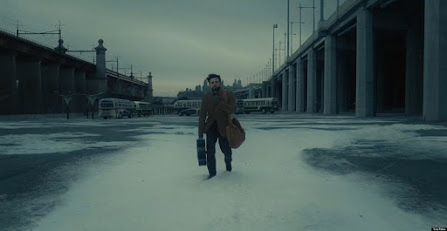Thoughts on Oppenheimer
“In my experience people who say no matter what seldom know what what might turn out to be” - The Passenger
There’s a version of Oppenheimer that is pretty terrible. One that focuses on building a team of expert scientists and hoorays about building the most biblically awesome weapon of all time, and I think a younger Nolan could totally make this movie. This older version of Nolan is far more interested in the emotional machinations of building a bomb than the physical ones.
Even when we do have the building the team segment it’s so lightning fast. Nolan doesn’t seem interested in these big name drops; they are there but not the focus. Instead, the focus is how large of an excursion getting these minds really is. The first hour moves like quicksilver. We’re moving countries in a cut and meeting new faces as quickly. The movie makes a point in slowing down when David Krumholtz comes into the same train car as Oppenheimer.
This starts off my favorite idea the movie throws at us.
Oppenheimer stands as not only a vision of the future but in this moment a synecdoche of Judaism. It’s easy to think that antisemitism only existed during this time under a dictator with a shitty mustache. It’s not fun to remember that the guarded gates that surrounded Germany were forged by American eugenics. In this scene Rabi (played by Krumholtz) asks Oppenheimer if he ever feels unwelcome here. Maybe he means specifically in whatever country they’re currently cutting through, but in a much more real sense he just means in this whole world. Oppenheimer makes a comment that the entire physics department is Jewish, so he doesn’t really feel any of the outside pressure. This isn’t Oppenheimer’s first mention of Judaism in the film. In an early meeting with Lewis Strauss Oppenheimer jokingly says that no matter how you say his last name they always know he’s Jewish.
This scene with Krumholtz in the train is as close as Nolan is willing to get with outright saying “antisemitism is deeply rooted in American culture, academics, and policy.” It just surprised me that he even broached the subject.
A little bit later Rabi comes to Los Alamos just before the project gets fully underway. They joke around in a way that seems like only these two can do. Something about Rabi seems to crack Oppenheimer’s obsidian shell of seriousness. I’ve read a couple of things that Rabi is the closest we have to a character with a conscience, and I disagree. It’s not that I don’t think he has one, but he is absolutely the only character that has unclouded forethought. He explains his worries that centuries of the highest levels of thinking would be disseminated into the most destructive weapon that we’ve ever seen. He also recognizes that as a Jewish person they have to win this race. The stakes for him and Oppenheimer aren’t just eternal bragging rights, but a right to have a family. Oppenheimer is in it for the love of the game so to speak. The theory of it all is far too enticing for someone of his stature, and maybe there’s a bit of ego there. For Rabi and the other Jews in America, WWII is a fight for the survival of those little Yiddish phrases we all love. Like I said I don’t think any of this is particularly groundbreaking, especially if you’re Jewish, but it’s just nice to see this in a hundred million dollar movie.
I was lucky enough to see this in 70mm, and if you have the opportunity to see it in this format you really should take the chance. A lot of the film takes place in brown deserts with the wild outcropping of light sage. On film these colors seem so true to life that there’s a very real feeling of what this place looked like. Of course the reason people even want to see it on 70mm is for the trinity test. It’s an incredibly arresting sequence that eventually turns your excitement to a grim understanding.
As we watch this biblical fire pillar reach to the heavens we can see every fold of flame, and on 70mm you can almost feel the heat. The longer you look at it though the more those feelings of excitement turn to ash in your mouth. You realize that those flames are the very architecture of the apocalypse. It’s great filmmaking that of course is punctuated by the Sanskrit phrase we’ve all been waiting for.
I have to touch on Cillian Murphy’s performance here as well. It is a marathon of a performance. All three hours of this film are predicated on the energy bestowed by Murphy. He’s stupendous and will see his fair share of time in the sun and it is rightfully deserved. There’s roughly one million supporting performances that I can praise, but I have to give notice to Alden Ehrenreich. He’s a nameless senate aide that spends most of the movie being a subtle question to Robert Downey Jr’s big answer.
I read somewhere that the Sanskrit word for death and the word for time are often confused for each other. Thanks for reading.


Comments
Post a Comment